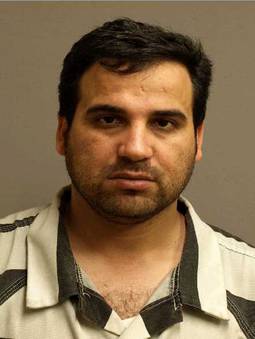Day Before Sentencing, Iraqi In Terrorism Plot Case, Mohanad Shareef Hammadi, Argues "Sentencing Entrapment".
Iraqi in terrorism case argues 'sentencing entrapment'
Andrew Wolfson
Mohanad Shareef Hammadi's lawyer cites a study of more than 500 terrorism prosecutions since 9/11 in entrapment defense Hammadi said he was unemployed and had no money or weapons when he was recruited by Waad Ramadan Alwan Lawyer said including surface-to-air Stinger missiles was government attempt to get a longer sentence for Hammadi
LOUISVILLE, Ky. -- Hoping to avert a life sentence, one of two Iraqi refugees to be sentenced Tuesday in Kentucky for attempting to send weapons and cash to al-Qaida alleges the government improperly schemed to get him a longer sentence.
A lawyer for Mohanad Shareef Hammadi cites a study of more than 500 terrorism prosecutions since 9/11 that found an FBI informant led more than one-third of the plots and provided all the necessary weapons, money and transportation.
In a sentencing memorandum, Hammadi's appointed lawyer, James Earhart, says his client was unemployed and had no money, weapons or means of transporting them when he was recruited by a confidential government informant.
In the first terrorism case in Kentucky, Hammadi and Waad Ramadan Alwan are to be sentenced in Bowling Green by Senior U.S. District Court Judge Thomas B. Russell.
They both pleaded guilty to attempting to provide material support to a foreign terrorist organization and lying about their backgrounds when they applied to be admitted into the United States as refugees.
They were arrested in May 2011 after they agreed to help a government informant load cash and weapons, including surface-to-air Stinger missiles, into a tractor-trailer, believing it was destined for al-Qaida.
Alwan also pleaded guilty to attempting to kill U.S. soldiers when he was an insurgent in Iraq.
In sentencing memos, prosecutors don't recommend a sentence for either defendant but assign "offense levels" to their crimes that would give them both life sentences.
In an unusual argument, Earhart asks for a reduced sentence of 15 years for his client, claiming he was a victim of "sentencing entrapment" by the government.
Unlike in a standard entrapment defense, in which a defendant claims he didn't have the required intent to commit the offense, Earhart contends that the government entrapped Hammadi into committing a more serious offense by including the Stinger missiles.
Conspiring to export a missile carries a mandatory minimum sentence of 25 years, Earhart says, and the "only reason this weapon was introduced by the government into the scheme" was to get that sentence. He alleges that the Justice Department was frustrated with courts imposing lower sentences in similar cases.
Earhart says that Hammadi initially lived in Nevada after he came to the U.S., but with no family there and unable to speak English, he moved to Bowling Green to take a job in a poultry factory. He got sick, lost that job, and was behind on his rent when the confidential informant began pressuring Alwan in January 2011 to recruit Hammadi, Earhart says.
The informant told Hammadi about the money and weapons that he and Alwan were supposedly shipping to Iraq and offered to pay Hammadi to participate, Earhart says in the sentencing memo.
The informant told Hammadi that all he had to do was carry the money and weapons supplied by the informant from a storage container to a truck.
"Hammadi had no role in the selecting or securing of the weapons," Earhart says in the memo.
He cites a survey of 508 terrorism prosecutions -- including those of Alwan and Hammadi -- published in the August 2011 edition of Mother Jones magazine, in partnership with University of California-Berkeley's investigative reporting program, that found in more than 150 of the cases the FBI provided the money and weapons and in "some cases even planted specific ideas for the plots."
The report's author, Trevor Aaronson, who has expanded on his findings in a book, "The Terror Factory: Inside the FBI's Manufactured War on Terror," published earlier this month, questions whether "U.S. law enforcement is creating the very enemy the U.S. fears," Earhart says.
He says the government, understandably trying to protect Americans from terrorism, has found "bigoted and suggestible" immigrants who are incapable of committing terrorism on their own and created acts of terrorism out of their "fantasies of bravado and bigotry."
Justice Department spokesman Dean Boyd declined to comment on Aaronson's book but referred a reporter to a review of it in The Wall Street Journal on Jan. 23 in which a former FBI supervisory special agent said Aaronson's claim that the FBI has cooked up terrorist plots is erroneous and that "an impartial review" of the agency's efforts to fight terrorism after 9/11 would give it "high marks overall."
Prosecutors Michael Bennett and Bryan Calhoun, both assistant U.S. attorneys, and Lawrence Schneider, a trial attorney in the Justice Department's counterterrorism section, don't respond directly to Earhart's claims in their sentencing papers.
But they say that both Hammadi and Alwan had a history of attacking Americans before they left Iraq.
Hammadi isn't charged with committing terrorist offenses there, but the prosecutors say he told the FBI after he was arrested that he participated in at least 10 improvised explosive device attacks on American targets as a member of the Jaysh al Mujahidin terrorist group. He also said that he fired on a U.S. soldier in an observation tower and that his goal in Iraq was "to kill Americans."
Alwan's fingerprint was found on an unexploded IED in Iraq, according to court records. Prosecutors also say in their sentencing memo that he told the informant that he blew up two Bradley tanks and participated in hundreds of attacks with IEDs, including one that killed Americans.
At one point he told the informant that his "lunch and dinner" were Americans, the memo says.






0 Comments:
Post a Comment
<< Home